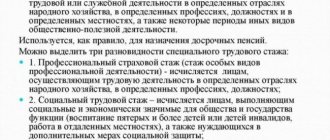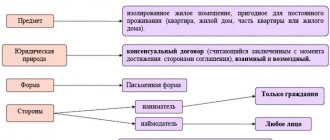Last will is a serious matter. Use it in a timely manner and with the greatest benefit for yourself. Perhaps the option of an inheritance contract is suitable for you.
In 2021, the law introduced a new way to transfer an inheritance - an inheritance contract.
Meanwhile, few people still know about this option, and if they have heard something, they treat it with distrust, as if it were something new. A will remains much more popular.
But according to it, a person does not receive anything in return, while an inheritance agreement allows one to transfer an inheritance with a benefit to oneself. Let's consider the main features of this method, its pros and cons.
What is an inheritance contract?
An inheritance agreement is an agreement that defines the circle of heirs and lists the conditions for the transfer of rights to the testator’s property after his death. The inheritance agreement may also indicate the conditions for the appointment of an executor and spell out the obligations of the heirs to perform certain actions of a property and non-property nature. That is, in order to obtain rights to property, the heirs will need to fulfill certain conditions, for example, support one or more family members until the end of their days, pay for university studies for a specific relative, finance some kind of organization, etc. If at least one clause has not been fulfilled, then the court will terminate the contract.
Question and answer Who can claim housing regardless of the will?
How to draw up an agreement
The will agreement is drawn up through:
- verbal agreement on the terms of the upcoming transaction;
- drawing up a preliminary written agreement;
- careful study of the compiled paper;
- eliminating identified errors;
- familiarization with the text of the agreement. The document is drawn up in Russian. For participating foreigners who do not know Russian, a copy is prepared in a language they understand;
- collection and verification of necessary documents;
- notarized approval. The office will check the contents of the agreement, eliminate errors, familiarize the participants with their rights and obligations, the results of the transaction, and register the agreements. It is also more convenient for all participants to sign the document. The original copy of the agreement is kept by the notary. Anyone’s evasion from notarization of a transaction will not allow it to be recognized as valid under Art. 165 Civil Code. The procedure must be video recorded if the participants do not object.
Now we list what documents are needed for the inheritance agreement (all papers are submitted with copies):
- participants' passports;
- technical and title documentation for property;
- conclusion on the estimated value of the inheritance;
- receipt of payment of state duty. According to paragraph 5 of Art. 333.24 Tax Code, 0.5% of the transaction amount is paid, taking into account Art. 333.25 Tax Code (minimum - 300, maximum - 20,000 rubles).
When does a joint will come into effect?
A joint will of spouses usually comes into force the moment it is certified by a notary. For this purpose, there is a date of preparation, which also corresponds to the moment the document entered into force. From now on, the participants in the contractual will are obliged to bear responsibility for it to each other.
In fact, the practice of such hereditary divisions is very small. But it is worth noting that in the Russian Federation, differences in the dates for drawing up an agreement and the entry into force of the obligations described in it are allowed. To do this, a clause with approximately the following information is specially inserted into the joint will: “The agreement comes into force on …”.
Article 1140.1 of the Civil Code of the Russian Federation
This article can be considered one of the components of the inheritance reform implemented in the last 2 years. When creating it, legislators relied on the experience of European countries.
According to the innovations, the testator is conditionally bound by the clauses of the contract: while still alive, a person can at any time refuse the agreement, compensating the counterparty for losses incurred. The law does not prohibit the alienator from freely selling the property that has become the object of the transaction. On this basis, it is still difficult to judge how applicable Article 1140.1 of the Civil Code of the Russian Federation on the inheritance agreement will be.
It is assumed that the need to conclude such a contract arises in 2 cases:
- the testator’s need to provide for himself during his lifetime or the future of his relatives who are unable to independently dispose of the property;
- the desire of the alienator to create an incentive among the heirs, thanks to the guarantee of the transfer of property to them.
Other situations are possible, but due to the lack of legal practice, it is difficult to assess the viability of the proposed mechanism.
Features of the inheritance agreement
In professional legal journals, such as “Zakon,” there is criticism of this bill regarding paragraph 12 of Article 1140.1 on the ability of the testator to dispose of property, even if it is included in the inherited part under the contract. This clause gives the testator freedom, when signing an agreement, to sell or donate his property to third parties, without taking into account the interests and fulfilled obligations of the party to the inheritance agreement.
After writing a joint will, the spouses are considered by the legislator as a single testator with all rights. The bill provides that in the event of divorce, the joint will of the spouses loses legal force.
The inheritance agreement stipulates that the person who wants to enter into inheritance rights assumes obligations towards the owner of the property that are specified in the document. In this case, the list of property that is an inheritance mass and passes to the acquirer after fulfillment of the terms of the document must be specified in detail in the text of the agreement.
All property passes to the acquirer after the alienator dies, unless otherwise stated in the text of the agreement. No additional actions on his part are required for this. In this case there is no deadline for entering into inheritance.
In terms of its content, this is an ordinary transaction in which an expert assessment of the value of the property must be carried out. The legal basis for this type of agreement is not directly related to inheritance.
Among the features of this type of transaction, it can be noted that in order to protect the rights of the parties to the agreement, all property that is specified in the agreement is pledged to the acquirer until the end of the document.
As with any agreement, both parties must be fully capable at the time it is entered into. If one of the parties is declared incompetent, then the document will not have legal force.
When including spouses' property in the text of the agreement, written consent from the second spouse is required. Without it, the deal will not be valid.
After death, the inheritance agreement is considered fulfilled when the property is transferred to the acquirer.
As for the possibility of terminating the contract, there are restrictions. Unilateral termination is possible only by court decision in the event that one party maliciously evades fulfilling its obligations. Making changes or terminating the document by agreement of the parties is permissible.
Among the advantages of an inheritance agreement are:
- additional opportunity to use your property;
- saving time when taking ownership (when drawing up a will there will be an additional six-month period);
- wide possibilities of the conditions specified in the document (which are limited only by the legislation of the Russian Federation).
Its main disadvantages:
- the possible emergence of disputes due to the fact that this form of document does not take into account the group of persons who, by law, claim an obligatory share of the inheritance;
- The pledge of property greatly limits the ability of the alienator to dispose of it at his own discretion.







